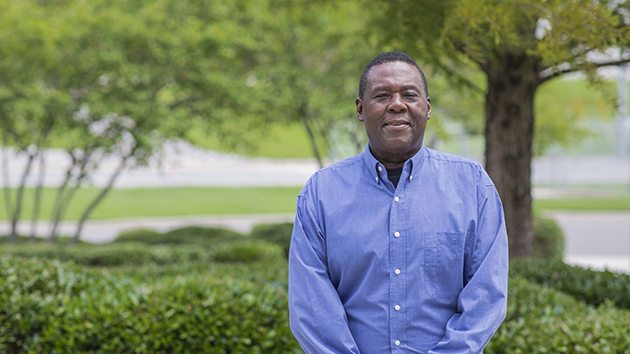I am mission success: Emmett Wade

Take 5 minutes to learn about Emmett Wade, fabrication and production support manager at Y‑12. All views and opinions are the employee’s own and do not necessarily reflect those of CNS.
When Emmett Wade received a layoff notice in 1982, the then‑Y‑12 machinist kept the faith.
“There were approximately 1,300 machinists working three shifts,” he recalled. “The work slacked up, and I got a pink slip. Management was trying to place everyone they could. I was offered janitor and guard jobs, but I held fast. I prayed about it and prayed about it. I kept thinking God has something else for me.”
Wade was soon offered a machine technician position in Assembly at Y‑12, which came with a one‑cent raise. Several positions at the site followed over four decades, including his current role of fabrication and production support manager.
“People don’t realize what it takes to get a part moved from building A to building B,” Wade explained. “You have to take in account all of the ES&H [Environment, Safety, and Health] concerns with the material and the security concerns, including classification.”
In addition to the complexity of the material movement is the demand for the service. “If one person wants something moved, there are several other people that want something moved, too,” Wade said. “We are always busy.”
Helping Wade keep tabs on what material is moving throughout Y‑12 are material controllers and material clerks, who he manages. Controllers perform “clockings” of material from one area to another, which establishes control and accountability when material is handled at each location. Clocking data includes weight, description, classification, and other details. Material clerks are hands‑on, picking up the material and moving it throughout the facility. Also, clerks do part markings, which provide important identification and verification for weapons components.
“You can have several hundred parts in one storage area,” Wade said. “We dig our way through to find what they need. You never know when someone will have a need for a certain part. We have parts that are 25 years old or older.”
“I’ve been doing this a while, so I’m pretty good at it,” he said. “I definitely know the territory.”
What is your favorite part or aspect of your work environment? How does that aspect make you know the mission is being met?
The accomplishment of getting the material where it needs to be in a timely manner. They will say, hey we appreciate you getting that part to us. This helped us make our deadline.
How does patriotism factor into your life? Did your level of patriotism change after working at Y‑12?
I had to learn that over the early part of my career. As a 19‑year‑old kid, you are just happy to have a job. I didn’t understand the whole method of what we were doing, but later I learned where these parts actually end up — on ships, planes, weapons for the military. The components we move are used in defense of our country.
What’s your favorite outside‑of‑work activity and why?
I have officiated football, basketball, and volleyball games at middle schools and high schools for 35 years. Participating in these activities, you have to have a high tolerance for people calling you names, yelling at you. This has helped me to be a patient person here at Y‑12, where I have to deal with all these requests coming in and with all of these different personalities and attitudes.
What work advice would you offer someone who is new to Pantex or Y‑12?
Gather as much knowledge as you can in every job. Not many people stay in the same job for the life of their career. What you learn in the first job will help you in the second job, the third, and so on. This will help you at each stage of your career.
